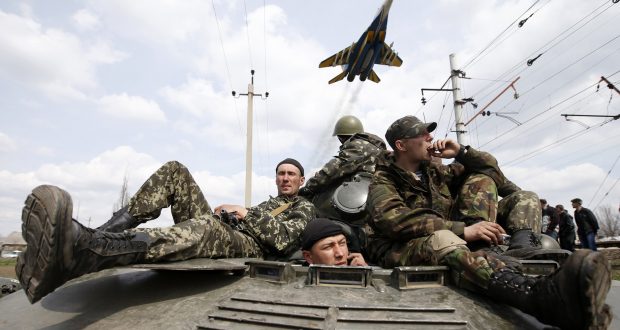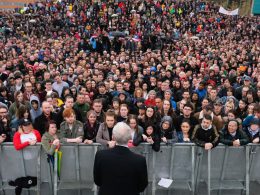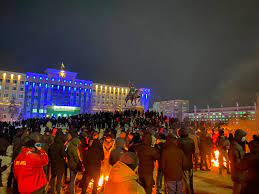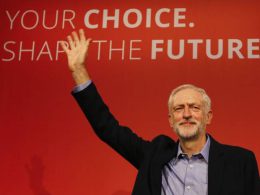By Sonja Grusch
War exists not just in history books. In recent weeks it has reared its head again in Europe. For countless people, especially in Africa, Asia and the Middle East, war is the brutal, daily normality — as in Syria, Afghanistan or Yemen. But with the conflict around Ukraine, the threat of war has become almost tangible in Austria as well. After all, Ukraine is less than 1,000 kilometers away. Further south and even closer, in the Balkans, the danger of armed conflict has risen again with the renewed conflict around the Serbian enclave in Bosnia-Herzegovina.
Why is the danger of war increasing?
War is a necessary component of capitalism, or rather of supposedly all-important “competition.” Put simply, capital must expand in order to survive. In a booming economy, this can work, at least in part, by creating new markets. In a stagnant or even shrinking economy, this can only be done at the expense of others. This is where national states come into play.
Every company — even if it operates internationally — has a “home base”, i.e. a state that it uses to enforce its interests. The state sets the “rules of the game” in its own country, by extending working hours or with tax breaks to make a company more competitive, as well as by supporting companies as they purchase raw materials and components, sell or invest abroad. To implement this, states then use all available means to back “their” capitalists: with subsidies, with trade agreements and, if necessary, also with more or less gentle force.
Lenin wrote his book “Imperialism as the highest stage of capitalism” in 1916, during the first World War. He made it clear that the war was never about the assassination of the Austrian heir to the throne, but about the re-division of imperialist spheres of influence. He wrote:
“Imperialism is capitalism at a stage of development where the rule of monopolies and finance capital is emerging, capital export has gained outstanding importance, the distribution of the world by the international trust has begun, and the division of the entire territory of the earth between the largest capitalist countries has been completed.”
He goes on to define characteristics of imperialism that are still valid and very visible today. There is:
- the concentration of production and capital to reach such a high level of development that it creates monopolies that play the decisive role in the economic life;
- the fusion of banking capital with industrial capital and the emergence of a financial oligarchy on the basis of this ‘financial capital’;
- the export of capital, as opposed to the export of goods, is particularly important;
- the formation of international capitalist associations that divide the world among themselves;
- the territorial division of the earth among the capitalist great powers, which has finished.
This leads to the situation we see today, in which the global cake is not becoming larger, but even shrinking, so the fight over who gets what share of the cake is intensifying.
The then German President Horst Köhler was unexpectedly honest in 2010 when he said that “in an emergency, military action is also necessary to protect our interests, for example free trade routes”. The statement was seen as scandalous at the time, but the increased foreign deployments of the German armed forces demonstrate he was right. In the last 10 years, the Federal Republic of Germany has increased its arms spending by 30%.
There have been similar increases in other countries. Global defense spending as a share of GDP increased from 2.2% in 2019 to 2.4% in 2020. That was during the Corona pandemic, when money for, among other things, health care was sorely lacking! Globally, an estimated $2,000,000,000,000 is spent annually on military purposes. Those two trillion dollars are sufficient to eliminate hunger, vaccinate everyone, and make manufacturing more climate friendly.
This increase in arms expenditure is an expression of the intensification of tensions, caused in part by the crises affecting the capitalist world economy, between different imperialist powers, at the centre of which are the USA, China, the European Union (and Britain), and Russia. Even the stunted efforts of the capitalists to profit from green production is driving new international competition as the fight to secure access to lithium and cobalt, which are important to produce rechargeable batteries, to rare earth metals key to making components in the high-tech sector, and to other raw materials is played out.
The U.S.-China plus Russia conflict
The intensifying conflict between China and the U.S. to decide “who is number one” is playing out on a number of levels. China is trying to massively expand its access to global markets using the Belt-and-Road Initiative — a “New Silk Road”. International politics are also being defined using the supply of vaccines to some countries — and not others. Numerous conflicts in the Indo-Pacific are an expression of the race between the USA and China, but sometimes involve other powers such as India. In both the Middle East and Europe, besides the U.S. and China, Russia is playing a big role. Russia is increasingly moving toward a fragile, and sometimes contradictory alliance with China much to the displeasure of the U.S., which sees China as the greatest economic threat, and Russia as the greatest military threat.
This is currently expressed in the Ukraine conflict, and in the Balkans. That neither the USA nor the EU is concerned with “democracy” becomes clear when one sees how indifferent both are to the observance of “human rights” by their allies, such as Saudi Arabia, or states from which they primarily want stability like Kazakhstan. Not a word is said about the misogynistic, ultra-conservative policies of the Polish PIS government when it comes to using force to prevent refugees from entering the EU at the border with Belarus.
Talk of “national sovereignty” can also be safely consigned to the realm of fairy tales and propaganda, for it is tangible economic and power-political interests that are at stake. The question of Ukraine joining NATO is not about what “Ukraine” or even “the Ukrainian people” want, but about the fact that the U.S. and its allies want to further expand their influence — and Russia wants to prevent that.
Russia is, in turn, trying to expand its influence in the region, e.g. through the Nord-Stream 2 pipeline, which is intended to economically disempower Ukraine. Or by the Russian Gazprom taking over the state-owned Serbian oil company NIS in 2008, by Russian banks expanding in Serbia and by Russia supplying fighter jets and military transports to Serbia. China is investing in various infrastructure projects in the Balkans, in Hungary and Poland. Serbia now has the largest Chinese “colony” in Europe.
This economic influence also has political consequences which are currently expressed, for example, in the question of Republika Srpska, the Serbian enclave in Bosnia-Herzegovina. Dodik, the “Serb leader,” is wreaking havoc in the delicate state structure of Bosnia and Herzegovina, declaring a boycott of state institutions. Separatist efforts are supported by Serbia, Hungary and Russia, as well as various far-right forces from Europe. Dodik himself is said to be massively corrupt.
This is one side of the story — the catastrophic economic situation in the Balkans in general, the even worse situation in Bosnia-Herzegovina, and the dramatic situation in Republika Srpska are often forgotten.
Western imperialism, and here especially the small but nevertheless aggressively imperialist Austria, exploited and bled the region dry after the collapse of Yugoslavia. Companies were closed down, the profitable parts were bought up and dismantled, and especially Austrian banks and insurance companies spread their influence. Militarily, too, influence has been expanded, with troops from the European Union Force (EUFOR) alliance intervening and the accession to NATO of Albania, Bulgaria, Croatia, Slovenia, Montenegro and North Macedonia.
The EU treats Bosnia-Herzegovina like a colony and expresses this through the “High Representative,” who acts as a quasi-governor. For more than 12 years until 2021 this was the Austrian Valentin Inzko. During his time there was no improvement in the social situation. How centrally the Balkans are seen as Austria’s sphere of influence is shown by the fact that the largest part of the growing “budget for military affairs” is used for the Western Balkans. According to Minister of Defence Klaudia Tanner, arms investments are at an “all-time high.”
Population falls by the wayside in imperialist tug-of-war
However much established politicians like to refer positively to the alleged “neutrality of Austria”, it has never existed. Capitalist Austria has always positioned itself on the side of the “West” and the interests of capital, and like other such bourgeois states, it hides behind its “neutrality” when asked to support workers or the oppressed.
Like the other imperialist powers, Austria is not interested in what the population of contested areas such as Ukraine want. Talks over the country’s fate continued for over a week before representatives of the country were even invited as the major players negotiated how to divide the region up between NATO and Russia. The people of the Balkans and their social situation are continuously ignored in the same way.
In response, other political forces in Ukraine, in Republika Srpska as well as in many other areas whip up nationalism, or hide behind empty phrases about “democracy” to divert attention from the dramatic social situation. But nationalism is no more capable of solving the problems than the EU, US or any other power. No “side” in these conflicts, whether “the West” in the form of NATO, nor the dictatorships of Russia and China stand up for the rights of the working class.
The real root of the conflict is that Russia is trying to resist the advance of NATO across Eastern Europe, while the US wants to put Russia, as a potential ally of China, in its place. The media of each country is jumping on board, and instead of pointing out the crimes of each, a one-sided picture of either the NATO or Russian warmonger is drawn. As socialists, choosing sides on the basis of “the enemy of my enemy is my friend” is not only nonsense, but dangerous, as it neither solves the social problems, nor reduces the threat of war. The Ukrainian government is no more on the side of the Ukrainian people, than the Russian government is on the side of the Russian people.
War is in the air, even if the ruling elite of each side claim they want to prevent it. They do this not because they want to avoid human casualties, but because they see the danger that a war over Ukraine could trigger a series of other conflicts, and escalate completely out of control. The consequences would be dramatic: a war virtually on the EU’s doorstep, close to the still radioactive Chernobyl ruins, waged with state-of-the-art weapons. And yes, “neutral” Austria has also sent arms to the region. It would result in tens of thousands of casualties, countless refugees, and would fuel further conflicts in the region. It would drive up gas prices and thus further destabilize the economy. Apart from the dramatic humanitarian, social and environmental consequences, it would also have consequences for the global economy and the international balance of power.
But even if this war is averted, others will follow, because as the French socialist Jean Jaures said:
Capitalism carries war within it, just like clouds carry rain”.
As socialists, the question to be answered is: How can this new militarism be pushed back? How can wars be prevented or stopped? How can a peaceful world be achieved? Wars are caused not because “man is inherently violent”, but by the system in which we live, based on the exploitation of people, and on inequality.
Even “peace conferences” held by the ruling politicians or bourgeois-capitalist institutions like the UN cannot end conflicts. The hope that they can be settled in this way is an illusion, because it is the various imperialist nations who sit around the negotiation table. Maybe a temporary ceasefire, a breathing space, can result, but this is only because both sides see the economic benefit over open armed conflict. The causes of conflict cannot be resolved in this way, as long as the imperialist governments continue to represent the imperialist interests of “their own” capital.
As socialists, we campaign for the expropriation of the war industry, and the use of these wasted resources to meet the needs of ordinary people. This needs to be linked with the overthrow of the ruling political elites and their replacement by democratic structures of the workers and oppressed.
“The main enemy is at home,” German revolutionary Karl Liebknecht said in 1915. He meant that the working class of one country should not fight against the working class of another country, because they have the same interests, while they have nothing in common with their own ruling class.
It is for this reason that members of the ISA, whether campaigning against western imperialism in the US, or facing arrest in Russia for opposing the Kremlin’s role in Kazakhstan, Belarus and Ukraine are all united in opposing the calls for war over Ukraine, refusing to support either Russian or Western imperialism, or Chinese, German, or any other imperialism, and calling for united working class struggle against the warmongers and the capitalist system they represent.
The working class has no interest in economic exploitation, and it is the only force that can overcome national tensions. The workers’ movement and its activists should form the basis of a future anti-war movement, to express the common interests of workers and youth, the oppressed of different nationalities, ethnicities and religions.
This should be taken to heart by the trade union leadership. If a war does break out, it should avoid the mistakes it made during the Corona pandemic when it retreated behind the trap of “solidarity in the national interest”. In this respect, the Austrian Trade Union Federation (ÖGB) should not stand together with representatives of the Austrian government, the Chamber of Commerce and energy companies such as OMV over whether to sanction Russia or not, but instead needs to take an independent stand oriented exclusively to the interests of the working class in Russia, Austria and Ukraine — none of which has any interest in war or occupation.
An anti-war movement must be independent of the ruling elite and its parties and institutions, composed of activists democratically organised from the schools, universities and especially the workplaces. The employees of OMV, for example, or other companies with economic ties with Ukraine, Russia, but also with the USA, can directly appeal to their work-comrades there to emphasize their common interests, and build a common campaign to reject war, pointing out who profits from rearmament and war. Because as Karl Liebknecht put it in a nutshell:
“Capitalism is war — socialism is peace.”












